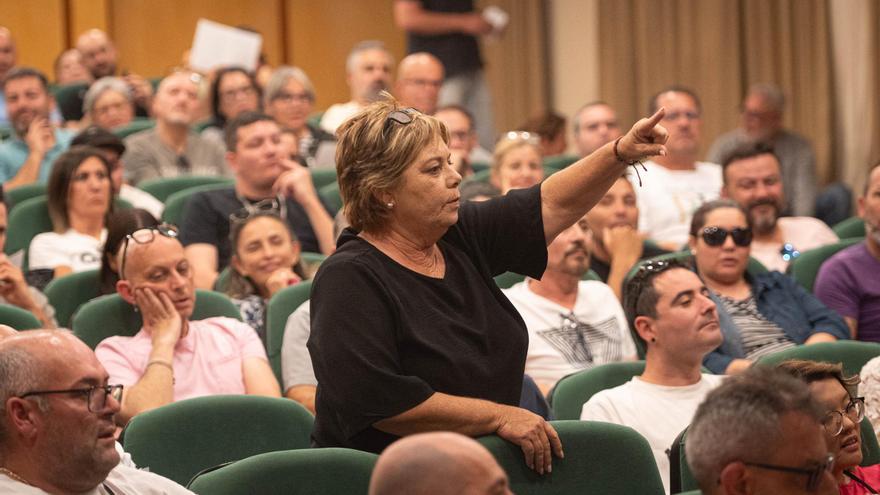
A strike will occur during Holy Week in the hospitality sector of the province of Tenerife. On Wednesday, the unions dismissed the latest counteroffer put forth by the hotel association (Ashotel) and its counterpart in the restaurant sector (Aero), which proposed a salary increase of up to 6% this year for workers in the industry—only 0.25% short of the unions’ demands. Despite weeks of discord and the direct involvement of the Canarian President, Fernando Clavijo, workers will walk off the job this Thursday and Good Friday, crucial days for tourist activity, with occupancy rates hovering around 90%.
The unemployment situation, therefore, continues despite a pre-agreement with the employer that all union organisations signed—except UGT—on Wednesday morning, which promised a 2% wage increase from July, as stipulated in the Provincial Hospitality Agreement. An additional 2% was included from April to mitigate the purchasing power loss of workers. Furthermore, the document proposed another 2% rise in July, applicable only in hotels lacking existing salary agreements. In the restaurant sector, the increase was set at 3%. The document also incorporated a clause where the employers pledged to safeguard the purchasing power of employees’ salaries.
The Assembly of the Base Trade Union Delegates— the most representative organisation in the sector— narrowly rejected the distrust towards the strike. The vote ended with 57 in favour and 51 against. The gathering held in the afternoon at the Iberostar Anthelia cinema in Adeje was tense, showcasing various opinions, and ultimately, the decision to strike was upheld.
The Canary Islands government is concerned about the potential impact of protests on the destination’s image abroad
The Assembly of Worker Commissions (CCOO) also rejected the signed pre-agreement, deeming the salary increase proposed by employers as insufficient. UGT was the sole initiating union of the strike that did not sign the pre-agreement, as it believed the last counteroffer from the employers included less favourable conditions than before, leaving out salary increases for hotels with existing agreements. Meanwhile, I used the pre-agreement signed earlier and left the strike committee in its assembly.
Agreement in Las Palmas
This situation means that while there will be strikes in the province of Tenerife on Thursday, Las Palmas will be unaffected, although one of the two strike committees maintains it, they acknowledge its impact will be considerably diminished. This is due to the agreement signed last Saturday between the provincial employer and UGT and CCOO. The accord entails a total salary increase of 5% for this year—comprising the already agreed 2.25% and an additional 2.75%—along with a one-off payment of €650, which will be distributed in May.
The strike in the province of Tenerife poses a threat to the hotel sector during one of the peak holiday seasons in the islands, characterised by high occupancy rates. With hotels fully booked, the Tourism Ministry has issued a minimum service order of between 15% and 25% to ensure guest care. Minimum services that the unions contest as illegal and have escalated to the Superior Court of Justice of the Canary Islands.
Destination Image
How the strike will influence the perception of the Canary Islands abroad is a primary concern for the government, which, through the Minister of Tourism, Jessica de León, has been mediating between employers and worker representatives for the past month. The unions are demanding a significant salary increase, aiming for workers to benefit from at least part of the record revenues that tourist establishments are generating. Meanwhile, the employers wish to discuss other issues such as absenteeism, topics that had been sidelined until negotiations for the collective agreement began, which the pre-agreement aimed to resolve by April 30. Ashotel deemed the continuation of the strike as “preposterous”, asserting that it does not genuinely reflect demands for labour improvements, but rather a “pointless union squabble.”
Ashotel brands the strikes as unfounded and argues they do not meet economic criteria but stem from union conflicts
In Las Palmas, the agreement was reached with greater ease, whereas in Tenerife, even the personal involvement of President Clavijo, who met with unions and employers on Wednesday morning, has failed to resolve the situation. The Canarian President has been emphasising to entrepreneurs for over a year the necessity of raising wages, highlighting the need to distribute wealth generated by the sector amid rising discontent due to the issues it has caused.
The Ministry of Tourism imposes minimum services of 15% to 25%
The Ministry of Tourism for the Government of the Canary Islands has enforced minimum services during the strike. The order stipulates that for cleaning and maintenance, 15% of the staff must be present per shift each day. At reception and information desks, 25% of the workforce per establishment, shift, and day is required. For restaurants, a breakfast, lunch, and dinner buffet for guests must be maintained with at least 15% of the staff every day. The kitchen will also require 15% of its workforce.
The unions argue that these minimum services are illegal. According to CCOO, they represent a blatant violation of the fundamental right to strike, which should only be restricted in exceptional circumstances for services deemed essential to the community rather than just important. They also contend that the established levels are excessive.
















